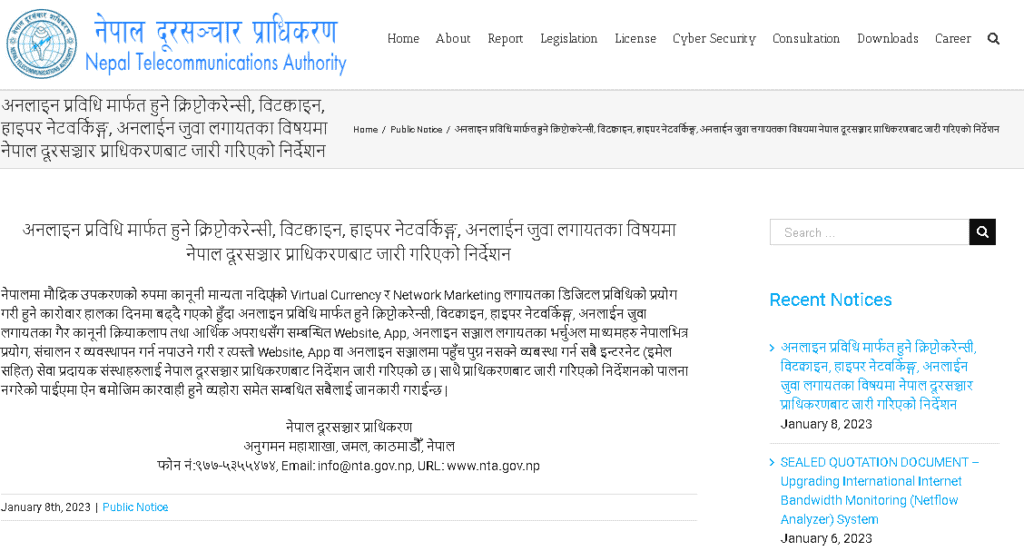Nepal Tells Internet Providers: Block Crypto-Related Websites, Apps
The country has declared transactions using digital technology illegal because these are not recognized as monetary instruments.

Subscribe to our newsletter!
Editing by Nathaniel Cajuday
- The Telecommunications Agency of Nepal has recently ordered the internet service providers of the country to prevent operating and managing crypto-related websites, applications, or even online networks.
- This is after the country has declared transactions using digital technology illegal because these are not recognized as monetary instruments.
- Nepal’s central bank has already banned all crypto-related activities in the country. It will join the eight other countries that also banned cryptocurrencies, such as China, Algeria, Bangladesh, Egypt, Iraq, Morocco, Qatar, and Tunisia.
While other countries are trying to adopt cryptocurrency and web3, the Nepal Telecommunications Authority recently ordered the country’s internet service providers (ISPs) to prevent operating and managing crypto-related websites, applications, or even online networks.
In the notification sent, the authorities noted that “transactions using digital technology, such as virtual currency and network marketing, which are not legally recognized as monetary instruments in Nepal, are increasing in recent days.”
And if the service providers fail to comply, Nepal emphasized that legal action will take place if any crypto-related activity happens on their platforms.

Instructions issued by the Nepal Telecommunication Authority regarding cryptocurrency, bitcoin, hyper networking, online gambling, etc. through online technology.
About Cryptocurrencies, Bitcoin, Hyper Networking, Online Gambling and more through online technology
Instructions issued by Nepal Telecommunication Authority
Transactions using digital technology such as virtual currency and network marketing, which are not legally recognized as monetary instruments in Nepal, are increasing in recent days.
This is not the first time that Nepal’s telecommunications authority has made a move regarding crypto. In April last year, the authority also sought information from the public about citizens who engage in illegal activities involving cryptocurrency.
Prior to this, the country has been hostile to cryptocurrency since 2021, when its central bank banned all crypto-related activities, including trading and mining.
Despite these initiatives to ban crypto in the country, Nepal recently ranked 16th in crypto adoption among the 154 countries surveyed as revealed by Chainalysis’ “The 2022 Global Crypto Adoption Index.” (Read more: PH Ranks 2nd in Chainalysis Crypto Adoption Report)
Aside from Nepal, eight other countries also banned cryptocurrency in their nations, according to a report by the Library of Congress. These countries are China, Algeria, Bangladesh, Egypt, Iraq, Morocco, Qatar, and Tunisia.
Last September, in line with the launch of their cheaper subscription offer—which now allows commercials—the media streaming giant Netflix imposed a ban on crypto-related advertisements. (Read more: Netflix to Ban Crypto Advertisements)
In the Philippines, a columnist from the Manila Times, Ben Kritz, suggested that crypto should just be banned for its volatility as well as for showing the characteristics of a Ponzi scheme. (Read more: Columnist Says Crypto Should be Banned Because of Volatility)
Moreover, Philippine senators also expressed their views about crypto and reminded the public to be cautious in dealing with it. Senator Win Gatchalian even emphasized that cryptocurrency mining is just a “glorified casino.” The lawmaker also encouraged the financial regulators to actively do their role in guarding the public’s interests. However, it could be remembered that during the meeting of the Senate Committee on Banks, Financial Institutions, and Currencies, these regulators, the Securities and Exchange Commission (SEC) and the Bangko Sentral ng Pilipinas (BSP), asked the legislature to draft specified laws regarding digital assets–as of writing the request is still unanswered.
For now, the Philippine regulators have just been actively reminding the public to be cautious and to do their own due diligence. Last November, BSP Governor Felipe Medalla reiterated the risks of blindly investing in cryptocurrency. (Read more: BSP Governor Medalla Reiterates: Crypto is Risky)
This article is published on BitPinas: Nepal Tells Internet Providers: Block Crypto-Related Websites, Apps
Disclaimer: BitPinas articles and its external content are not financial advice. The team serves to deliver independent, unbiased news to provide information for Philippine-crypto and beyond.





